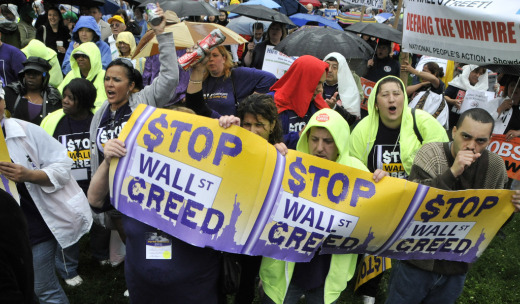
WASHINGTON – A sneak attack against financial re-regulation – undoing the reforms imposed on Wall Street and similar finaglers after the 2008 crash – is underway on Capitol Hill, an expert in the field warns.
Michael Greenberger, now a financial law professor at the University of Maryland and a former top regulator at the Commodity Futures Trading Commission (CFTC), says the legislation will come up before the Senate Governmental Affairs Committee in the middle of November. A committee aide said the hearing hasn’t been scheduled yet.
S3468, by Sens. Rob Portman, R-Ohio, Susan Collins, R-Maine, and Mark Warner, D-Va., would virtually halt all the reregulation of the financiers whose casino gambling – which Greenberger detailed — caused the crash and the following Great Recession, Greenberger told the Center for National Policy on Nov. 1.
Their “Independent Agency Regulatory Analysis Act” would force all federal agencies that regulate or are poised to regulate Wall Street, derivatives traders, leveraged buyout firms and other financiers to justify their rules on a cost-benefit basis to the White House. Only on its OK would proposals become public, Greenberger said.
The AFL-CIO is wary of S3468, worrying how it could hamstring the Occupational Safety and Health Administration and other worker regulatory agencies, not just the financial regulators, federation President Richard Trumka said on Nov. 7.
“We’ll fight attempts to make positive regulation so slow or impossible,” he said.
The regulatory agencies “would have to show the rules have greater benefits than costs,” adds Jim Lardner, spokesman for Americans for Financial Reform (AFR), the union-backed coalition that helped the Obama administration enact the new clampdown on financiers, the Dodd-Frank Act, in the Democratic-run 111th Congress.
“The rules would go to the White House Office of Information and Regulatory Affairs, which was created by the Reagan administration as a backdoor where industries could go to get regulations delayed or decimated,” he adds. “It’s done that under both Republican and Democratic administrations.”
Financiers fought Dodd-Frank every step of the way, despite the damage their scheming caused, Greenberger said. They watered it down to some extent, but did not block it. Now, they’re trying to delay its rules. S3468 is part of that push. heir lever is campaign contributions, he added. The Supreme Court’s 2010 Citizens United decision opened the way to cascades of corporate cash into political campaigns and the financial services industry has been among the biggest givers.
The American people, Greenberger said, want more regulation of the financial sector. Indeed, polls show majorities favor restoring the high and impenetrable wall between regular banking and such financial finagling erected during the New Deal, the Glass-Steagall Act. Congress, pushed by its GOP majority and Democratic President Bill Clinton, repealed Glass-Steagall just over a decade ago, Greenberger said.
Just before that, Greenberger and his then-boss, CFTC Chair Brooksley Bourn, tried to regulate the derivatives and other shadowy deals. Top Clinton officials squashed their initiative.
The “cost-benefit” bill has prompted AFR and its union backers, including AFSCME, the AFL-CIO and the Service Employees, to rev up their lobbying of lawmakers, Lardner said. They’re concentrating on senators on the committee that will hold the hearing. Collins, one of the deregulation bill’s co-authors, is that panel’s top Republican. Warner’s participation gives it a veneer of bipartisanship.
“Our coalition has 250 unions, civil rights groups and consumer groups,” he explains. “We’re already contacting the senators in their home states,” holding events and placing op-eds in newspapers warning about the legislation, adds Lardner. The coalition wrote senators last month, strongly opposing the bill. They said it would require at least 13 new cost-benefit analyses – and that’s only one bad feature.
Many of the regulatory agencies “already have requirements for cost-benefit analyses. S3468 would…subject independent agency decisions to executive oversight, and require a preeminent focus on economic impact,” the unions and their allies wrote.
There would be “unprecedented White House influence over independent agencies,” giving “future administrations power to stop any regulations they oppose.”
The Obama administration appears uninterested in opposing the backdoor repeal of Dodd-Frank, Greenberger said. He’s not sure the president understands the stakes – or the fact that sponsors may try to sneakily attach it to must-pass legislation moving through the lame-duck post-election session of Congress.
“This is an inside job,” Greenberger warns. “Obama didn’t tell the people about this. FDR did” — when advocating Glass-Steagall — “in his Fireside Chats.”
Photo: Bill Burke/AFL-CIO












Comments